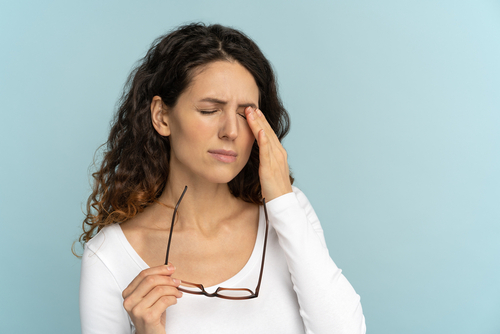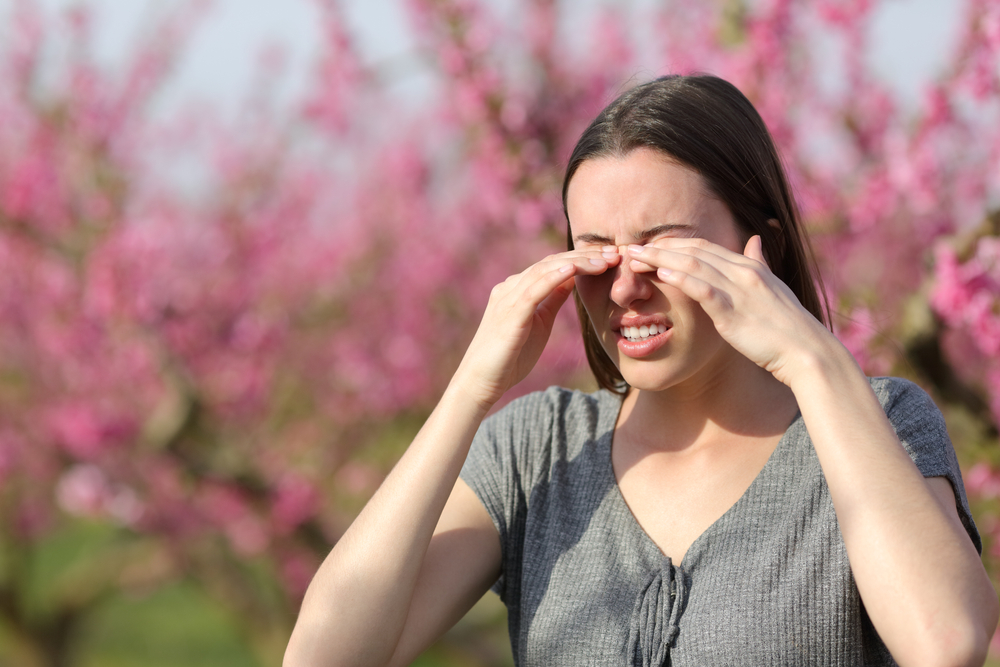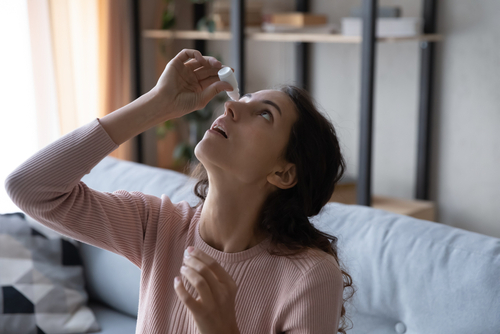Does the Environment Affect Dry Eye Symptoms?
Have you ever noticed your eyes feeling dry or itchy? While this is a sensation most people feel from time to time, persistent symptoms are cause for concern, as they can indicate dry eye syndrome.
But, do dry eye symptoms always mean you have dry eye syndrome? You may notice that environmental conditions, such as humidity, temperature, and seasonal allergies, increase these symptoms.
Keep reading to learn more about dry eye syndrome, including how the environment plays a role in the symptoms you might experience!
What Is Dry Eye?
 While occasionally feeling like your eyes are dry isn’t necessarily an eye condition, dry eye syndrome is a consistent issue that impacts your eye’s tear film. The tear film contains three layers and plays a big role in protecting the eye surface.
While occasionally feeling like your eyes are dry isn’t necessarily an eye condition, dry eye syndrome is a consistent issue that impacts your eye’s tear film. The tear film contains three layers and plays a big role in protecting the eye surface.
When the tear film is damaged, disrupted, or unbalanced, it can cause dry eye disease, which can have many irritating symptoms.
What Causes Dry Eye?
Dry eye disease has many potential causes and underlying risk factors that increase your chance of symptoms. In most cases, dry eye is caused by anything that disrupts the tear film.
You can have dry eye disease either because of decreased tear production or because your tears evaporate too quickly. Some risk factors that can lead to or cause dry eye syndrome include:
- Aging
- Certain medications, like cold medicines, birth control, and antidepressants
- Certain health conditions, including rheumatoid arthritis, lupus, and thyroid disorders.
- Side effects from laser eye surgery or contact lens use
- Blepharitis
- Vitamin A deficiency
- Dry air, smoke, wind, and other environmental factors
- Allergies
Dry eye can have many causes. Environmental factors like the weather and seasonal allergies can cause dry eye issues, but they aren’t the only risk factors.
The best way to determine what’s causing your dry eye is to see your eye doctor at Complete Eyecare West for diagnosis and treatment.
Signs You Have Dry Eye Syndrome
Dry eye symptoms can be frustrating, especially if they don’t seem to go away. If you have any of the following symptoms, it’s a good idea to make an appointment for an eye exam, as you deserve to find relief:

- Burning or stinging sensation in your eyes
- Itchy eyes
- Mucus around your eyeballs
- Light sensitivity
- Watery eyes
- Blurry vision
- Trouble driving at night
- Issues wearing contacts
- Feeling like something is in your eyes
While it might sound strange, water eyes are often how the body responds to the irritation caused by dry eyes. Your tear film and glands may work overtime, causing increased tear production.
How Do Environmental Factors Impact Dry Eye?
The environment can definitely play a huge role in increasing or causing dry eye symptoms. But, they aren’t the only potential factor.
If you already have dry eye issues for another reason, environmental factors can worsen your symptoms. Even if you generally don’t have issues with dry eye, high winds, dry air, or smoke can cause temporary dry eye symptoms, but these will likely go away when you leave the environment.
Allergies are also a potential cause of dry eye symptoms and dry eye disease. Seasonal allergies, such as spring pollen, can make dry eye worse.
If you only have dry eye symptoms during certain times of the year, and if the symptoms lessen when taking allergy medications, the environment could be the cause.
Effective Dry Eye Treatment
If you only have occasional symptoms, artificial tears are a simple, effective treatment option. Mild dry eye symptoms can be caused by the weather, screen usage, etc.

With artificial tears or other lubricating eye drops, you can easily relieve symptoms. If you have severe or chronic dry eye, prescription eye drops or steroid eye drops often work well.
Prescription eye drops reduce inflammation and increase hydration, but you’ll need to use them for at least 90 days to see results. Along with eye drops, there are other treatment options available.
Punctual plugs are tiny silicone plugs added to the opening in the inner corners of your eyes. These plugs help keep real and artificial tears from leaving your eyes.
When you visit our office, our eye doctors will determine the best treatment plan, taking your eye health and dry eye causes into account.
Find Relief From Dry Eye Syndrome
Treating dry eye requires diagnosing the underlying cause and addressing the symptoms. At Complete Eyecare West, our eye care team will work with you to alleviate your symptoms and ensure you no longer deal with dry eye.
For most people, eye drops are effective, so relieving your dry eye symptoms doesn’t have to be difficult or uncomfortable. However, some people need more advanced treatment.
Setting up an eye exam at our office is the best way to get started treating dry eye.
Are you experiencing symptoms of dry eye? Schedule an appointment at Complete Eyecare West in Columbus, OH, today!







